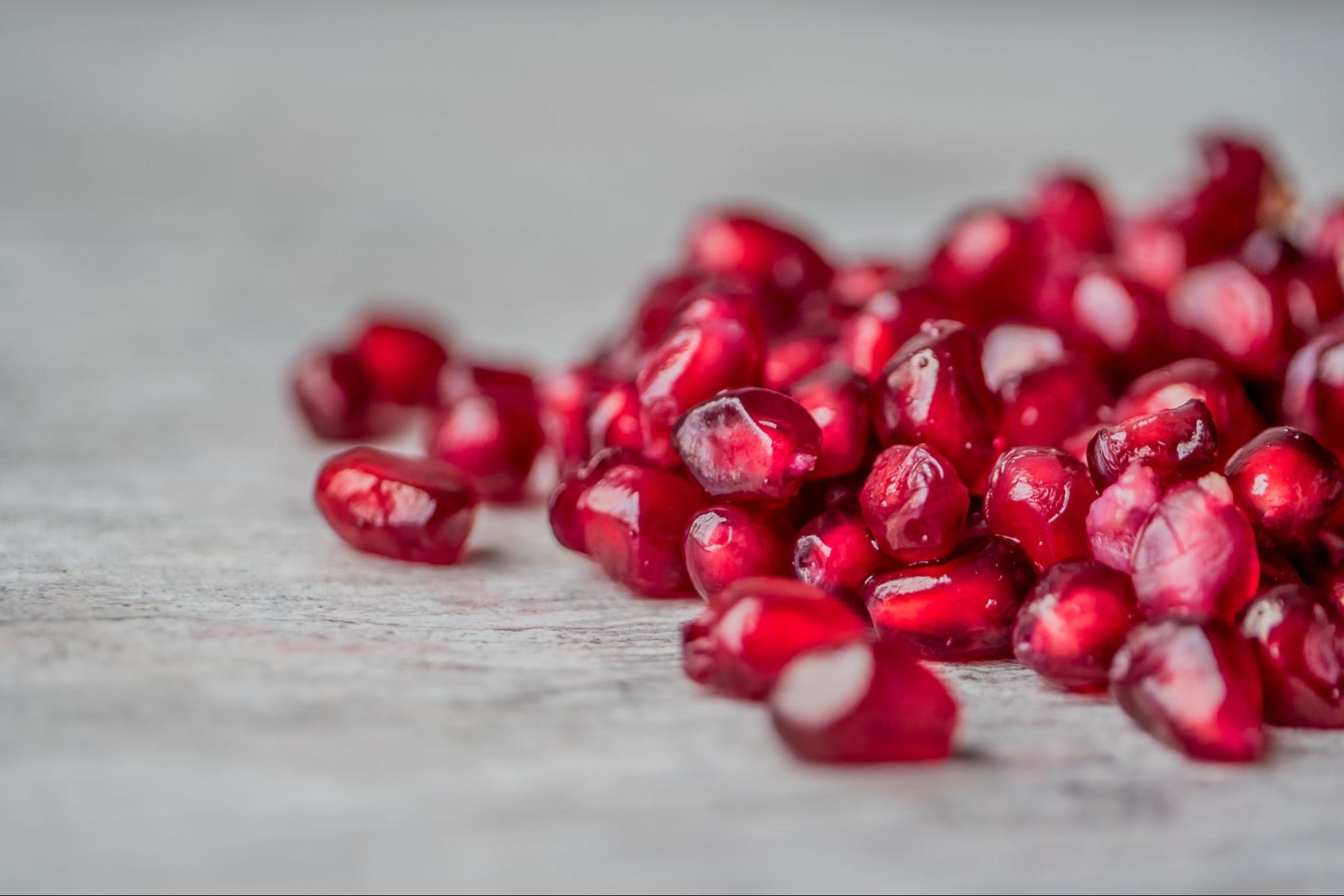
The Role of Urolithin A: A Comprehensive Review of its Health Potential
Welcome to the story of urolithin A, a bioactive compound discovered 40 years ago. Urolithin A’s complex molecular mechanisms and diverse physiological effects have made it a focus of nutraceutical and longevity research.
In order to understand this compound better, let us first define it in more detail.
Exactly What is Urolithin A?
In simple terms, urolithin A is a postbiotic compound that results from the metabolism of ellagitannins in the colon microbiome. Ellagitannins are polyphenolic compounds found in several fruits and nuts. The most famous sources of urolithin A are berries like pomegranates, strawberries, and raspberries.
After consumption, ellagitannins are metabolized in the human digestive system, resulting in the formation of urolithin A as one of the primary metabolites. Only three bacteria that belong to the genus Gordonibacter have the ability to produce urolithin A.
The production of this longevity molecule varies from person to person. Some individuals lack the necessary bacteria to produce it, while others with them may still not produce enough. The only way to get enough urolithin A is through supplementation. However, before discussing that further, let’s explore the potential health benefits.
Urolithin a Benefits
An increasing number of scientists are interested in urolithin A due to its potential health-promoting properties, particularly in relation to cellular health, mitochondrial function, and anti-aging effects. Research suggests that urolithin A plays a role in activating cellular processes such as autophagy, which is involved in cellular cleansing and renewal, as well as influencing mitochondrial biogenesis, the process of generating new mitochondria within cells. These mechanisms have led to investigations into its possible benefits in combating age-related diseases and promoting overall well-being.
Take a look at how this incredible compound affects the human body.
Cellular Health Support
Mitochondria are cellular organelles responsible for energy production and cellular metabolism. By stimulating mitophagy (the process of breaking down damaged mitochondria), urolithin A restores mitochondria and improves mitochondrial respiratory capacity. Other than that, it stimulates autophagy, the metabolic process of recycling damaged cell components. In those processes, energy is released and cells are renewed. This prevents the accumulation of harmful substances that lead to cell aging.
Anti-Inflammatory Effects
The body’s immune response occurs as a result of the body’s reaction to an antigen (most often a microorganism from the external environment). However, this response can also happen as a reaction to self-antigens or transplants. In this case, we are talking about a harmful immune response that is associated with aging and the onset of many diseases. Urolithin A slows down the production of pro-inflammatory molecules and thus affects the weakening of the harmful immune response.
Potential Anti-Aging Function
Animal studies have shown the strong anti-aging potential of this exceptional compound. Urolithin A increases the production of collagen type 1 while reducing intracellular reactive oxygen species. In addition, the processes of degradation of waste materials in cells via mitophagy and autophagy further support these findings.
Muscle Health Impact
According to several studies, urolithin A enhances muscle mobility and improves the structure of muscle fibers by reducing the effects of muscle degradation caused by aging. How exactly does it affect muscles?
The first mechanism is the effect on mitochondria, which results in improved energy production, allowing muscles to function optimally and efficiently. Another process is the regulation of protein turnover in muscles, which are their primary building blocks. Protein turnover is the balance between protein breakdown and synthesis within muscle cells. In this way, urolithin A helps to preserve muscle mass, which is especially important in the aging process and other conditions that cause muscle degeneration.
Cardiovascular Health
In a couple of studies, urolithin A has demonstrated powerful effects on cardiovascular health. It exerts beneficial impacts through antioxidant activity, improving myocardial contractions, reducing plasma lipid levels and aortic lesions, and supporting blood vessel function. These mechanisms collectively suggest that urolithin A might contribute to the prevention or mitigation of cardiovascular diseases such as cardiac ischemia and atherosclerosis. However, further studies are needed to better understand the precise extent and specific mechanisms of its impact on cardiovascular health.
Neuroprotective Role
It is believed that urolithin A has a positive effect on the preservation of nervous system function (based on studies conducted on animals). These data indicate the possibility of protection against ischemic stroke and multiple sclerosis. Urolithin A achieves those effects by improving the function of neurons. Due to the breakdown of toxic substances in neurons, nerve cells survive longer, and neurogenesis (the process of creating new neurons) occurs. This affects improvements in associative memory and influences longer memory.
Spine and Joint Health
Numerous animal studies have demonstrated the remarkable effects of urolithin A on spinal cord and joint diseases.
In the aging process, the intervertebral discs in the spinal column degenerate. Urolithin A helps to alleviate these changes by narrowing the disc of the intervertebral space. In addition, its effect on collagen production alleviates such damage. The second joint disease in which urolithin A activity has been observed is osteoarthritis. This longevity compound was found to improve the cartilage structure of the knee joint, contributing to pain relief.
Weight Control Assistance
The effects of urolithin A on cellular processes and fat and glucose metabolism suggest that this compound may be beneficial for weight loss.
Experiments on mice have shown that urolithin A:
- Increases the sensitivity of cells to insulin, which directly affects the regulation of body weight;
- Increases the oxidation of fatty acids, which reduces the accumulation of lipids in adipose tissue;
- Restores the antioxidant capacity of the liver;
- Increases the excretion of fat from the body;
- Inhibits the production of new fat cells.
Other Urolithin A Benefits
Apart from these findings, it is believed to be beneficial for the following conditions as well:
- Inflammatory intestinal diseases
- Acute kidney injury
- Metabolic dysfunctions (dyslipidemia and glucose intolerance)
How to Choose the Best Urolithin A Supplement?
It is almost impossible to get the required dose of this valuable compound from natural sources. That is where supplementation comes in! These supplements aim to provide a concentrated and bioavailable form of urolithin A that can be efficiently used in the body.
If you want to feel the benefits of urolithin A for your health, now it is possible! We are introducing the Vana Health System, an innovative formula for better health and vitality.
The unique formula of the Vana Health food supplement is based on three essential polyphenols: urolithin A, quercetin, and resveratrol. Vana Health also contains complementary plant extracts for a perfect balance of nutrients. All ingredients are carefully selected and divided into two daily doses for optimal performance. This unique formula will help you regulate your weight, eliminate excess water, and restore your energy levels.
Shine today with VANA.
Conclusion
The scientific research on urolithin A has led to great discoveries and revealed some of its extraordinary potential. As our understanding of its mechanisms deepens, its role in cellular health, mitochondrial function, and its impact on various health areas becomes increasingly intriguing. However, while the allure of this remarkable compound is evident, careful scientific evidence remains crucial. The future of urolithin A supplements depends on continued research that discovers their full potential and clarifies their contributions to human health.
Frequently Asked Questions
What is the best source of urolithin A?
The primary dietary sources of urolithin A are foods rich in ellagitannins:
- Pomegranates (notably high in ellagitannins)
- Berries (strawberries, raspberries and blackberries)
- Nuts (especially walnuts and pecans)
- Certain fruits (such as kakadu plums and cherries)
Is urolithin anti-aging?
Research suggests that urolithin A has potential anti-aging effects. These effects are thought to stem from its ability to stimulate cellular processes like autophagy, which helps clear out damaged components within cells, and enhance mitochondrial function, which is crucial for energy production and overall cell health.
By promoting these cellular mechanisms, urolithin A has shown promising effects in preclinical studies for mitigating age-related cellular decline and associated health issues. However, it’s important to note that while its effects are promising, the concept of “anti-aging” is complex and involves numerous biological factors.
What is urolithin used for?
Urolithin A is used for various purposes, but the most famous are:
- Cell function and vitality
- Muscle performance
- Body weight maintenance
- Cognitive performance
- The health of the cardiovascular system
- As an aid in inflammatory conditions
- For the anti-aging effect of the entire body


